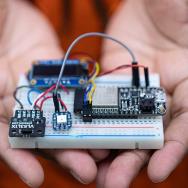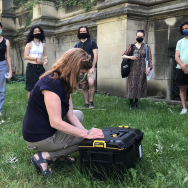University of Chicago undergraduate students will soon have a new opportunity to delve into the wondrous world of video games, guided by a game designer who consulted on one of the biggest films of the past year.
This spring, postdoctoral researcher Katherine Buse will help bring a creative blend of science and technology to the College curriculum. An expert on digital media, science fiction and environmental humanities, Buse’s scholarship draws from a range of theory and practice—including her recent work on “Dune,” the Oscar-nominated adaptation of the acclaimed novel.
Entitled “Gaming History,” the new course will explore how video games reflect, theorize and alter our understanding of the past. For example, how have popular titles, such as “Call of Duty,” functioned in the pedagogy of public history? Working with co-instructor Bradley Bolman—a historian of science and postdoctoral researcher at UChicago—Buse has designed the course to include visits from a few guest speakers. The two have also reserved one day per week for live play, during which students can try out various games, taking into account how they represent the structure of time, causality and choice.
Students will engage in original archival, ethnographic and media archeological research to critically analyze media objects, as well as designing some of their own. The unique seminar draws on both practice-based research and traditional humanistic research, reflecting UChicago’s commitment to understanding topics through an interdisciplinary approach.
“Projects that ask me to apply my humanistic knowledge–from game design to consulting on science fiction–always help me see my studies in a new light and clarify what is most important to me as a scholar. Ideally I can help students make better choices as creators, workers and citizens,” Buse said. “UChicago has some amazing new programs that take its interdisciplinarity to a new level by blending research and practice in this way. The Media Arts and Design (MAAD) and Inquiry and Research in the Humanities (IRHUM) programs are two of the most exciting, and I am delighted that this course is cross-listed in both.”
An intellectual journey
As a young girl reading science fiction novels, Buse’s interest in climate science skyrocketed as real-world current events began paralleling the stories she enjoyed.
Her intellectual journey took off in her time as an undergraduate student at Duke University. After reading seminal texts like Octavia Butler’s “Dawn” and Kim Stanley Robinson’s “Science in the Capital” trilogy, she continued to connect the dots between the foreboding books she consumed and the reality of climate change.
“I eventually realized that climate scientists were already using and referring to science fiction in these interesting ways,” said Buse, a postdoc at UChicago’s Institute on the Formation of Knowledge. “You would think that climate scientists wouldn't talk about science fiction, because they would be afraid of seeming like they're not doing real work. And so, I thought, ‘This is kind of paradoxical to me, I want to understand more.’”
After college, she went on to earn master’s degrees at the University of Liverpool and the University of Cambridge, and her P.h.D at the University of California, Davis. She still collaborates with the UC Davis ModLab as a game and graphics designer.
Throughout her academic career, Buse has noticed the immense pressure placed on climate scientists in conversations about climate change. That disproportionate burden, she said, stems from how policymakers often treat science as sets of recommendations, predictions and plans.
In her opinion, studying science and culture together—instead of in isolation—can yield better habits of thinking and encourage experts in other fields to work in partnership with scientists.
Since 2017, for example, Buse has worked on a game called “Foldit,” originally created nearly a decade earlier by University of Washington researchers. The game immerses players in puzzles to decipher three-dimensional structures of proteins. Buse and her ModLab team utilized comic-like graphics to create a science fiction narrative featuring characters of diverse backgrounds to represent how knowledge is collectively produced. The beta version of their narrative, “Foldit: First Contact,” is set to be released later this year.
Their goal was to make science and culture relatable and accessible, and to reinforce how arts and science are necessary to solve big problems—a key learning objective for all students in Buse’s course this spring.
“Video games meet climate change: Dr. Buse’s research not only brings together the far reaches of human experience, but it also recognizes that new fields may emerge out of what have not yet been thought of as fields,” said Shadi Bartsch Zimmer, director at the Institute on the Formation of Knowledge.
Answering ‘impossible’ questions
Buse’s Ph.D. dissertation includes an entire chapter about “Dune,” Frank Herbert’s 1965 classic science-fiction novel, as an example of the kind of planetary world building that science fiction shares with climate science. As she was writing that chapter, a mutual colleague connected her with screenwriter Eric Roth, who had just begun adapting the novel to a screenplay. Roth was impressed by Buse’s work, and invited her to assist with the research for the feature film that was released in 2021.
In their early conversations, the two discussed how best to portray the book’s various social issues—including water scarcity on the fictional desert planet of Arrakis, gender and race, and the intersection of capitalism and environmental crises. Buse also worked with Roth during the drafting process to help ensure that portrayals of such conflicts were authentic to their real-world inspirations.
One obstacle she said she encountered while helping recreate Herbert’s world was the fact that the author had not created a “closed system” in his original books, which have been famously difficult to adapt for the screen. While today’s science-fiction paradigm is based on meticulous and comprehensive world-building, Herbert had instead wanted a “loose ball of yarn with strands trailing out,” Buse said. Having extensively researched Dune while writing her dissertation chapter about it and read it multiple times since grad school, her expertise made her the perfect candidate to conquer the challenge.
“I would get asked these questions [from Eric] that were basically impossible to answer because Herbert deliberately left them ambiguous, like ‘What does the sandworm eat?’” Buse said. “I guess the reason that Eric would ask me questions like that is because he knew that I had read it so many times that I wouldn’t forget the two sentences on page 200, where a tiny clue to sandworm diets gets mentioned.”
For Buse, one of the most rewarding moments of watching the final film was knowing how much work had gone into making the movie behind the camera. From costuming to CGI to set design, she said she came away with a newfound appreciation for filmmaking.
Outside of her work on games and movies, Buse can be found writing her book project, “Speculative Planetology: Science, Culture, and the Building of the Model Worlds,” which calls for increased practices of participatory world building between scientists, fiction writers, engineers and policymakers. By thinking both within and beyond a monolithic planetary future, she argues that science fiction creators will broaden the range of tools, narratives and perspectives that humans hold in their current scientific endeavors.
“Speculative planetology is something that’s been co-built by science and culture,” she said. “I hope that means the humanities will move in a direction of not just receiving and responding to bad news from science, but becoming more productive and proactive in thinking about the relationship between science and culture.”
—Registration for spring quarter classes opened on Feb. 21. Learn more about the “Gaming History” course on the IFK website. This story was first published on the College website.

